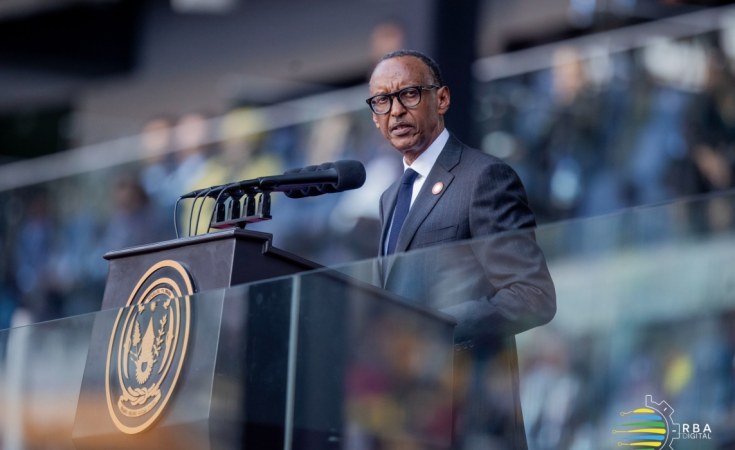A war of words between Rwandan President Paul Kagame and South African President Cyril Ramaphosa has sparked fears of a potential diplomatic--and possibly military--confrontation between the two nations over their involvement in the escalating conflict in the eastern Democratic Republic of Congo (DRC). The heated exchange, marked by accusations, denials, and thinly veiled threats, has raised concerns that the situation could spiral into a broader regional conflict.
Kagame's Scathing Rebuttal
In a strongly worded statement, President Kagame accused South African officials, including President Ramaphosa, of distorting the truth and spreading lies about their recent conversations regarding the DRC crisis. Kagame's remarks were a direct response to Ramaphosa's public address, in which the South African leader blamed the M23 rebel group and the Rwanda Defence Force (RDF) for the intensification of violence in the region.
Kagame made several pointed clarifications:
RDF's Legitimacy: He emphasized that the RDF is a legitimate army, not a militia, and rejected any insinuation that Rwanda is involved in destabilizing activities.
SAMIDRC's Role: Kagame dismissed the Southern African Development Community (SADC) Mission in the DRC (SAMIDRC) as a "belligerent force" rather than a peacekeeping mission, accusing it of collaborating with genocidal armed groups like the FDLR, which target Rwanda.
South Africa's Role: He questioned South Africa's credibility as a peacemaker, stating that if South Africa prefers confrontation, Rwanda is prepared to respond in kind.
Kagame's tone was unapologetic and combative, signaling Rwanda's readiness to defend its interests and reputation in the face of what it perceives as unfounded accusations.
Ramaphosa's Grievances and Condolences
President Ramaphosa, on the other hand, struck a somber and defiant tone in his address. He mourned the loss of 13 South African soldiers killed in the recent clashes, blaming the M23 rebels and the RDF for the attacks. Ramaphosa emphasized that South Africa's military presence in the DRC is part of a SADC and United Nations effort to bring peace and stability to the region, not a declaration of war against any country.
Ramaphosa called for an immediate end to hostilities, respect for the DRC's territorial integrity, and adherence to diplomatic processes such as the Luanda and Nairobi peace initiatives. He also urged all parties to silence the guns and work toward sustainable development and prosperity in the region.
The Brewing Conflict
The conflicting narratives from Kagame and Ramaphosa highlight the deep divisions and mistrust between Rwanda and South Africa over their roles in the DRC conflict. Kagame's assertion that South Africa is not fit to mediate and his thinly veiled threat to "deal with the matter" if confrontation is preferred suggest that Rwanda is prepared to escalate its response if necessary.
Meanwhile, Ramaphosa's emphasis on South Africa's commitment to peacekeeping and his condemnation of the M23 and RDF's actions indicate that South Africa is unwilling to back down. The loss of South African soldiers has further inflamed tensions, with Ramaphosa vowing to honor their sacrifice and continue the mission.
The Risk of Escalation
The situation is fraught with risk. The DRC conflict has long been a flashpoint for regional tensions, with multiple actors, including Rwanda, Uganda, and various rebel groups, vying for influence. South Africa's involvement as part of the SAMIDRC mission has added another layer of complexity, particularly given Kagame's assertion that SAMIDRC is not a neutral force but a belligerent one.
If the war of words continues to escalate, there is a real possibility that Rwanda and South Africa could find themselves in direct conflict, either through proxy forces in the DRC or through diplomatic and economic measures. Such a confrontation would have devastating consequences for the region, destabilizing an already volatile situation and undermining efforts to achieve lasting peace.
A Call for Diplomacy
As tensions rise, the international community must step in to mediate and de-escalate the situation. The United Nations, African Union, and SADC have a critical role to play in ensuring that the conflict does not spiral out of control. Diplomatic efforts, such as the Luanda and Nairobi processes, must be reinvigorated, and all parties must commit to dialogue rather than confrontation.
For now, the specter of a "war" between Rwanda and South Africa looms large. Whether this remains a war of words or escalates into something more will depend on the actions of both nations in the coming days and weeks. One thing is clear: the stakes could not be higher for the people of the DRC and the broader


